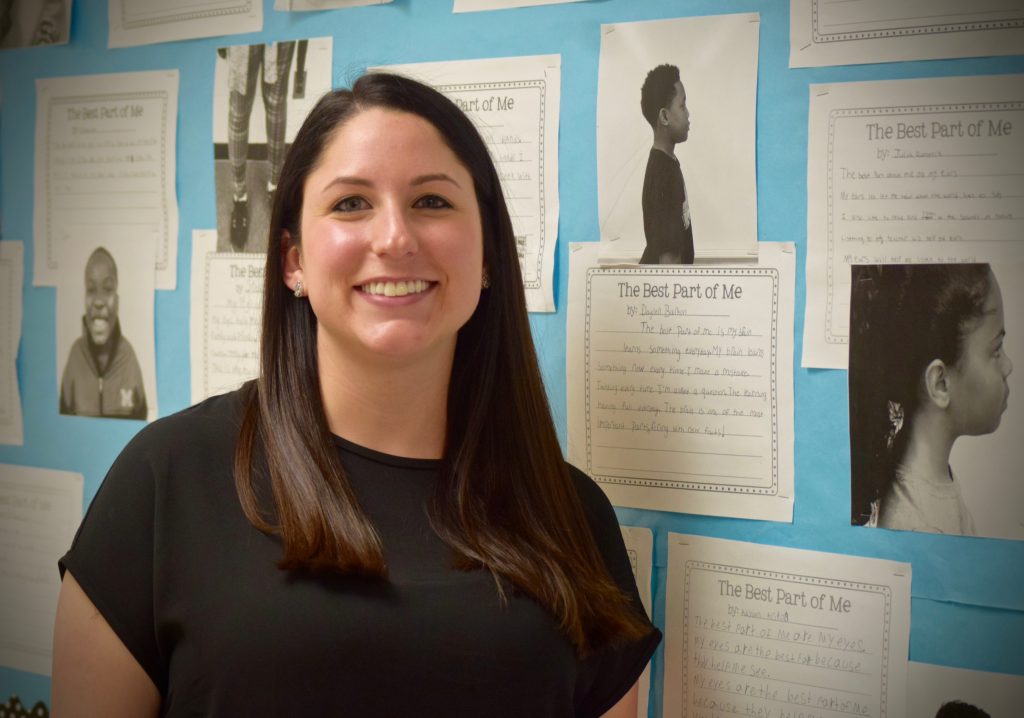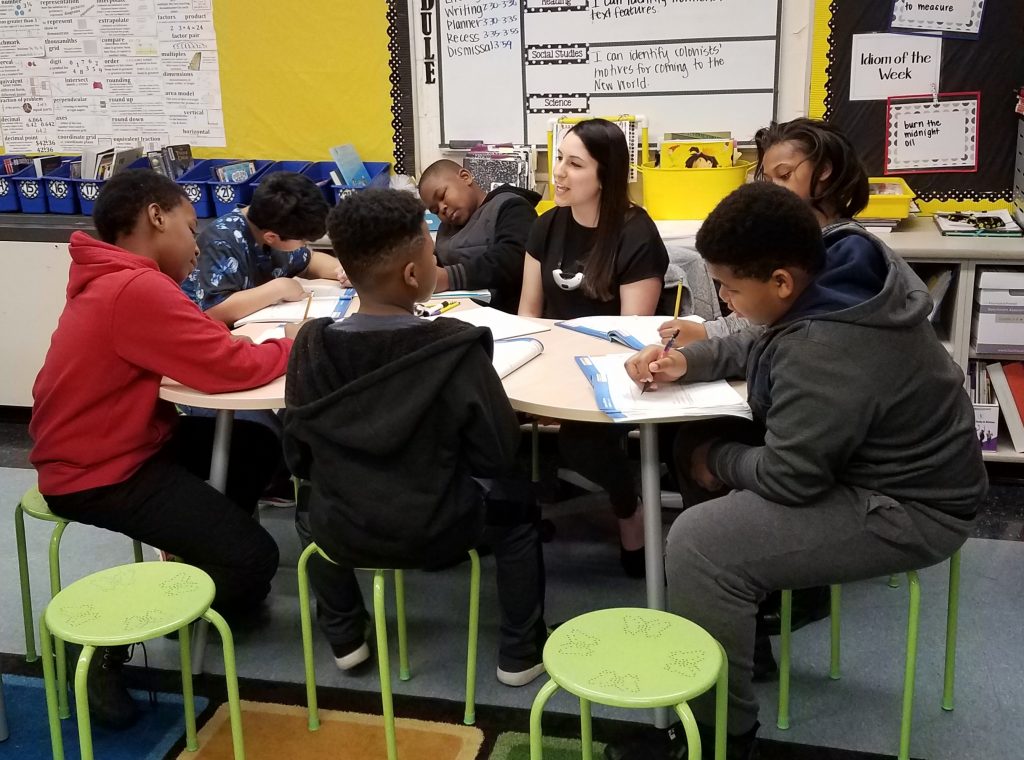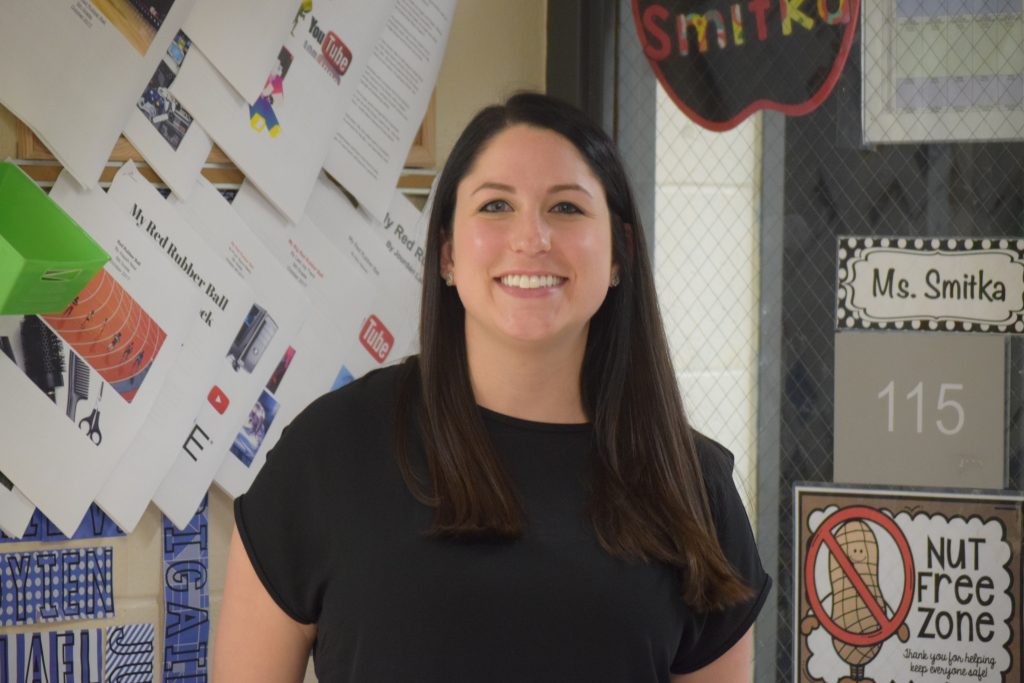

By Jo Mathis/AAPS District News
Nicole Smitka grew up in Ann Arbor and considers herself lucky to have attended Lawton Elementary, Slauson Middle School, and Pioneer High School. With a passion for math and science, she went on to the University of Michigan to earn a bachelor’s degree from the School of Education in 2011. Although she focused on math and science, reading captured her heart and she went on to receive a master’s degree in reading from Eastern Michigan University in 2016.
Smitka spent her formative years as a teacher in Detroit and Ypsilanti teaching grades K-2 before moving into a Title 1 position to focus on small groups and boost achievement. That work honed her love of teaching as she connected with students and saw growth in key skill areas. Now in her second year teaching fifth grade at Carpenter Elementary School, Smitka loves the challenge of the older students and still connect with each student’s strengths and struggles. “We are able to focus, but still have fun as a class which makes me happy to come to work every day,” she says.
Outside of school, Smitka loves to spend time playing soccer, entertaining her new kitten, and devouring books.
What inspired you to become a teacher? Did you have a Plan B? In high school, I worked with younger children in various capacities and wanted to be a teacher. During the summers, I was a junior counselor at Wide World Sports Camp and at Gretchen’s House in Ann Arbor. I also coached soccer to younger teams in my club and helped coach at Slauson. While I was considering a career in education at that time, I was discouraged by many people due to the “state of education” at the time.
Thus, when I started college, I planned to pursue a career in dentistry. Three key experiences during college, however, solidified my desire to go into education.
One was an independent study class in psychology where I worked at the Little Blue Preschool in Ann Arbor. During this class I was able to tailor my experience to learn about child development in a contextual setting by observing students, planning developmentally appropriate lessons, implementing the lesson, and reflecting on the success of the lesson. This showed me how rewarding instruction could be.
Another experience that led me to teaching was working for the Women In Science and Engineering camps as a counselor for middle school girls. In this experience, I was able to share my interest in the sciences and hook other girls’ interest in the field.
The third critical experience was tutoring a high school student in calculus. This situation led me to consider learning from a different perspective as I took on the lens of my student. It also exposed me to the idea that learning is multifaceted because her impediment to success was a lack of access to the language, not a lack of understanding of the math concepts.
These experiences led me to understand that teaching was my calling. They showed me that, regardless of age, I needed a career where I was serving and helping future generations to grow and succeed. That is what gives me joy and a sense of purpose each day.
What if any changes have you seen in elementary/middle/high school students over the years? Over the years, the utilization and integration of technology in the classroom have advanced. This has been beneficial in that it allows more personalized learning and aids the teachers in targeting the precise skills in which each student is strong or struggling. With thoughtful application, this allows teachers to propel student achievement farther.
How do you keep students engaged? One of my core beliefs as a teacher is setting and maintaining high expectations for all students. Setting expectations and providing supports to meet or exceed these standards serves as a mode of engaging students. In order to meet these needs, I differentiate instruction and make the information attainable and conveyed it in a way that students understand. Also, I try to make the content relevant for students in the context of their lives. In addition, I attempt to convey my passion for learning to students.
What’s the most important thing you’ve learned about teaching in your two years at AAPS? In the last two years, I have learned to become less critical of myself and my practice. I have always been reflective, but I think I have begun to use my reflection in a more productive way. As I tell my students: Mistakes are a part of life, but how you move on and learn from those mistakes is the important aspect. So I keep things fun, focused, and moving forward. I have also learned to be more flexible with my planning and instruction. I believe there is a balance between trying to deliver the most effective lesson and knowing that not everything will go as planned. Students or other events can—and always will—surprise you. I am still learning to manage this balance.

Describe an average workday. While I’m not specifically a morning person, on work days I thrive on getting to work early. Two days a week, I lead a before-school Title I math group. On the other days, I like to come in early to review my lesson plans and prep any last minute materials. These minutes are crucial! When students arrive, we hit the ground running. The day is filled with whole group and small group instruction in the various subject areas. Laughter and serious learning are interwoven throughout. Then after school, I typically have a meeting or other school commitment, such as Girls on the Run. This provides varied viewpoints or activities as a nice conclusion to my day.
What advice would you give to a first-year teacher?
- Be flexible.
- Overplan.
- Consider management of each lesson and transition.
- Seek feedback and be receptive to the guidance of others.
- Be open to new strategies and approaches.
- Implement routines and procedures with fidelity.
- Build relationships with students and families early with positive contact.
- Say yes to new opportunities!
Favorite educational websites:
- Flocabulary to provide hooks for lessons
- MobyMax for Science and Social Studies
- FrontRowEd for adaptive math practice
- Core5 for literacy skills
- XtraMath for fact fluency
Apps you can’t live without: In my personal life, I could not live without Apple podcasts. I start each day listening to podcasts. They provide me with daily news, perspectives on society, and humor. They’re a nice way to access information without slowing me down in the morning. I regularly listen to the following shows:
- Code Switch
- Up First
- The Daily
- TED Radio Hour
- More Perfect
- All the Crooked Media shows (Pod Save America, Pod Save the World, Pod Save the People, With Friends Like These, Crooked Conversations, and more.)
- Hidden Brain
- NPR Politics
- Girl Boss Radio
- Invisibilia
- Embedded
What’s your favorite to-do list manager? I prefer a traditional planner. Being able to physically cross items off my list is satisfying. It also provides a reminder of how much has already been accomplished! This keeps me focused on my accomplishments as well as what still needs to be completed.
What is the most rewarding part of teaching? The most rewarding part of teaching is seeing the growth in students not just academically, but socially and emotionally too.
What has surprised you most about the profession? What surprised me most was the collaborative nature of teaching. I have had the benefit of working in buildings with supportive teams that work together and learn from one another. I find that every teacher, novice or experienced, has knowledge from which the whole team can benefit.

What do you wish everyone realized about the work of a teacher? I wish people understood the multidimensional nature of the work and the level of dedication teachers commit to their relationships with all educational stakeholders (students, families, community members, colleagues, administrators, etc.) and to their professional practice before they even reach the implementation phase.
The work of a teacher begins with relationships. Building relationships extends beyond the confines of the classroom and the school day. It involves ongoing contact and participation in community events. It also means thinking about and potentially feeling concern for students when school is not in session or after they have progressed to the next grade.
By developing these relationships we can then utilize professional practices we have developed. To maintain and improve these skills teachers must be lifelong learners who participate in ongoing growth individually, at the building level, the district level, and even through additional platforms.
With these elements and their many facets, teachers are able to plan and deliver quality instruction that meets individual students’ needs. The actual implementation also requires many techniques and skills of its own, which should not be discounted.
How do you recharge? I recharge by running, playing soccer, and taking fitness classes. I also enjoy relaxing with a good book. Spending time with friends and family is reinvigorating as well.
What’s most exciting about your professional life right now? Your personal life? I am excited to coach my first season of Girls on the Run with one of my fantastic coworkers and a couple of supportive parents from our community. I look forward to building new relationships and strengthening existing ones through this experience. I also am encouraged by the idea of building girls’ confidence in themselves.

Congrats Nicole! Loved the article. You deserve it the recognition.
Congratulations Ms. Smitka! Your commitment to assisting your colleagues and inspiring our students speaks a lot to your character. Thank you for sharing your energy with our community. You make Carpenter a better place for ALL!